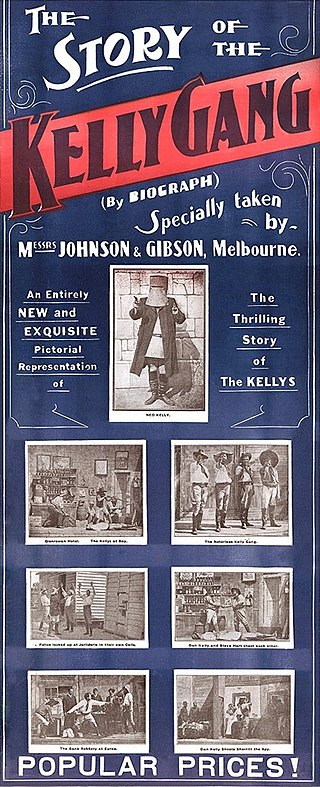Related Research Articles

The Story of the Kelly Gang is a 1906 Australian bushranger film that traces the exploits of 19th-century bushranger and outlaw Ned Kelly and his gang. It was directed by Charles Tait and shot in and around the city of Melbourne. The original cut of this silent film ran for more than an hour with a reel length of about 1,200 metres (4,000 ft), making it the longest narrative film yet seen in the world. It premiered at Melbourne's Athenaeum Hall on 26 December 1906 and was first shown in the United Kingdom in January 1908. A commercial and critical success, it is regarded as the origin point of the bushranging drama, a genre that dominated the early years of Australian film production. Since its release, many other films have been made about the Kelly legend.

William Joseph Lincoln was an Australian playwright, theatre manager, film director and screenwriter in the silent era. He produced, directed and/or wrote 23 films between 1911 and 1916.
The Glenrowan Affair is a 1951 movie about Ned Kelly from director Rupert Kathner. It was Kathner's final film and stars VFL star Bob Chitty as Kelly. It is considered one of the worst films ever made in Australia.
Alexander Roy Harwood (1897–1980), better known as A. R. Harwood, or Dick Harwood, was an Australian film director and producer who also worked in exhibition. He was inspired to become a filmmaker when he was posted to Tahiti to work for an insurance company and watched the shooting of Never the Twain Shall Meet (1925). He returned to Australia and produced and directed The Man Who Forgot (1927).

Moonlite is a 1910 bushranger film about Captain Moonlite, played by John Gavin, who also directed. It was also known as Captain Moonlite and is considered a lost film.
Sheepmates was a proposed Australian film from director F. W. Thring based on a 1931 novel by William Hatfield.
When the Kellys Rode is a 1934 Australian film directed by Harry Southwell about Ned Kelly.
It Is Never Too Late to Mend is an Australian feature-length silent film written and directed by W. J. Lincoln. It was based on a stage adaptation of the popular 1865 novel It Is Never Too Late to Mend: A Matter-of-Fact Romance by Charles Reade about the corrupt penal system in Australia. It was called "certainly one of the best pictures ever taken in Australia."
The Mystery of the Hansom Cab is an Australian feature-length film directed by W. J. Lincoln based on the popular novel, which had also been adapted into a play. It was one of several films Lincoln made with the Tait family, who had produced The Story of the Kelly Gang.
Lincoln Cass Films was a short-lived Australian film production company.
The Bells is a 1911 Australian feature-length silent film directed by W. J. Lincoln. It is based on the famous stage melodrama by Erckmann-Chatrian, adapted by Leopold Lewis, which in turn had been adapted for the Australian stage by W. J. Lincoln before he made it into a film.
The Lost Chord is a 1911 Australian feature-length film directed by W. J. Lincoln based on the famous song The Lost Chord by Sir Arthur Sullivan.

The Double Event is a 1911 Australian feature-length film directed by W. J. Lincoln based on the first novel by Nat Gould, which had been adapted several times for the stage, notably by Bland Holt.
Called Back is a 1911 Australian feature-length film directed by W. J. Lincoln based on a popular play which was adapted from an 1883 novel by Hugh Conway. Although the movie was a popular success it is now considered a lost film.
The Luck of Roaring Camp is a 1911 Australian feature-length film directed by W. J. Lincoln now considered a lost film. It was highly regarded in its day, in part because it was based on a play that was popular with audiences.
The Life of Rufus Dawes is a 1911 Australian silent film based on Alfred Dampier's stage adaptation of the 1874 novel For the Term of His Natural Life produced by Charles Cozens Spencer.
Charles Villiers was an Australian actor and occasional director who appeared in many silent films. According to a contemporary report, "there is probably no actor in Australia that has done more consistent picture work than Mr. Villiers, both as heavy lead, and director." He was particularly well known for playing villains.
Amalgamated Pictures was a film exchange company in Australia.

Stanley Sadler Crick was an Australian film producer, distributor and politician. He joined the Melbourne office of Pathe Freres and became manager of the Sydney branch in 1909. He went into production, first in partnership with Herbert Finlay then helping establish the Australian Photo-Play Company.
Robbery Under Arms is a 1907 Australian film based on the popular 1888 novel. It was from the team of J and N Tait and Millard Johnson and W Gibson, who had just made The Story of the Kelly Gang. It is considered a lost film.
References
- ↑ "PICTURE PROFILES IN THE OLDEN DAYS". Winner . Melbourne. 9 February 1916. p. 11. Retrieved 28 June 2015– via National Library of Australia.
- ↑ "TABLE TALK OF THE WEEK". Table Talk . Melbourne. 5 November 1925. p. 7. Retrieved 28 June 2015– via National Library of Australia.
- ↑ "WHO'S WHO IN THE MOVIES". Table Talk . Melbourne. 16 May 1929. p. 25. Retrieved 28 June 2015– via National Library of Australia.
- ↑ "It All Began With a Feature Movie On The Kelly Gang". The News . Adelaide. 16 November 1946. p. 2. Retrieved 28 June 2015– via National Library of Australia.
- ↑ Everyones, Everyones Ltd, 1920, retrieved 15 March 2019